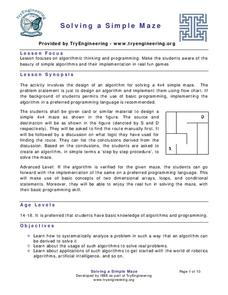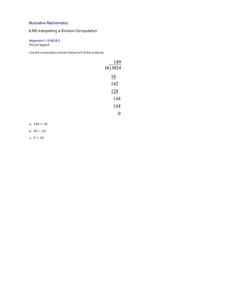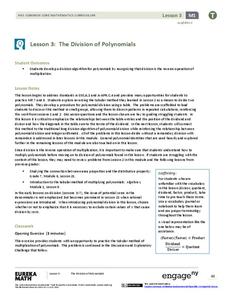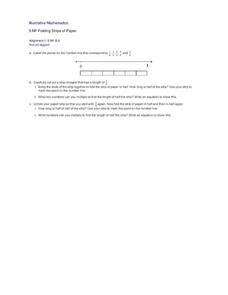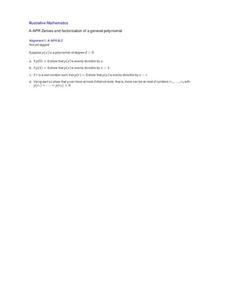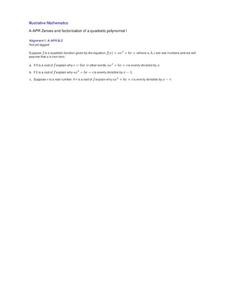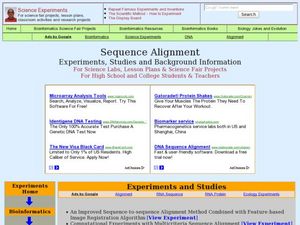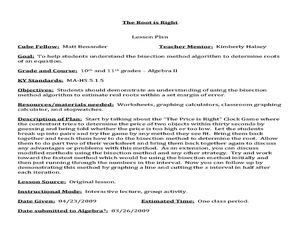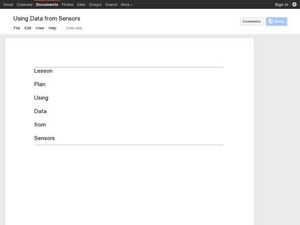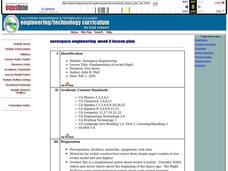TryEngineering
Sorting Socks is Algorithm Complexity
Use hosiery to teach computer science. Scholars use socks to develop a set of algorithms. They find ways to find a particular sock from a set and ways to sort socks. Finally, they use their algorithms to consider time complexity.
Curated OER
Brute Force and Other Algorithms
Students discuss why it can be difficult to solve word problems. In this algorithm lesson, students review better methods to outline word problems and solve the problem of the Ice Cream Stands. They discuss how the name Brute Force...
Shodor Education Foundation
Algorithm Discovery with Venn Diagrams
Here is a lesson that takes an interesting approach to analyzing data using box and whisker plots. By using an applet that dynamically generates Venn diagrams, the class forms a strategy/algorithm for guessing the rule that fits...
EngageNY
The Long Division Algorithm
Two methods are always better than one! The eighth installment in this series asks pupils to convert decimals to fractions using two approaches. Individuals first use the more traditional approach of long division and then use reverse...
Curated OER
Geometry and Rubik's Cube
Students explore geometry using a Rubik's Cube. In this 2-D and 3-D shapes lesson, students use the Rubik's Cube to find the center, edge and corner pieces. Students then find the dimensions of the Rubik's Cube and read the solution...
EngageNY
Comparing Methods—Long Division, Again?
Remember long division from fifth grade? Use the same algorithm to divide polynomials. Learners develop a strategy for dividing polynomials using what they remember from dividing whole numbers.
TryEngineering
Solving a Simple Maze
Solve a maze ... from a robot's point of view. In the lesson plan, your scholars build a small, simple maze from cardboard and then find a route from the start point to the finish point. They write an algorithmic process that a robot...
Illustrative Mathematics
Interpreting a Division Computation
Mathematicians show their understanding of a division problem. If a student can apply long division to a pair of numbers and determine a quotient, what other factors and multiples become apparent? The example illustrates a simple...
Code.org
Hard Problems – Traveling Salesperson Problem
Even computers find this to be a hard problem. In the eighth installment of a 12-part unit, young computer scientists learn about the traveling salesperson problem. They formulate algorithms to solve the problem and find out why it is...
Curated OER
Stochastic and Deterministic Modeling
Explore the difference between stochastic and deterministic modeling through programming. First have the class write algorithms for relatively simple tasks using pseudocode. Use the Python 2.7 program app to simulate Mendel's Pea Pod...
EngageNY
The Division of Polynomials
Build a true understanding of division of polynomials. Learners use their knowledge of multiplying polynomials to create an algorithm to divide polynomials. The area model of multiplication becomes the reverse tabular method of division.
EngageNY
Rational and Irrational Numbers
Back to the basics: learning how to add numbers. The 17th installment of a 35-part module first reviews addition techniques for rational numbers, such as graphical methods (number line) and numerical methods (standard algorithm). It goes...
Curated OER
Folding strips of paper
Fifth graders need concrete experiences to introduce a unit on multiplying fractions by fractions. A strip of paper is used to create a number line and represent 5/6. It is folded first in half, and then in quarters. After unfolding,...
Illustrative Mathematics
Zeroes and Factorization of a General Polynomial
These four problems will guide your class through the idea behind the Fundamental Theorem of Algebra, which states that a polynomial of degree n has exactly n roots. Use the division algorithm and the definition of a zero/root of a...
Curated OER
BLAST Algorithm
Students explore a series of activities on using BLAST. In this biology lesson plan, students explain the significance of BLAST in DNA query. They give real world applications of BLAST.
Illustrative Mathematics
Zeroes and factorization of a quadratic polynomial I
This activity uses the division algorithm and the definition of a zero/root of a function to guide your class to see the relationship between zeros and factors of a general quadratic, which can later be generalized to the Remainder...
TryEngineering
Solving Problems with Decision Trees
Combat crime with computers. The instructional activity teaches young computer scientists about decision trees and how to use them. They consider telecommunications subscriptions and how decision trees can help detect fraud.
Curated OER
Sequence Alignment
Learners explore the uses of sequence alignment. In this DNA activity students complete several experiments on sequencing and algorithms.
Curated OER
Predicting Lunar Eclipses
Students explore lunar eclipses and discover how to predict an eclipse the same way that ancient people did. They examine dates of recorded eclipses and find a pattern. Students apply an algorithm to the pattern.
Curated OER
Photometry of Stars and Clusters
Students apply an algorithm to measure the distance to stars in the night sky. In this photometry lesson, students observe stars in the night sky as they measure the distance to them and to the cluster, The Milky Way. They apply the...
Curated OER
The Root is Right
Students find the roots of an equation. For this roots lesson, students define the bisection method algorithm used to find the roots of an equation. They identify the margin of error in this process.
Curated OER
Multiplying and Dividing Fractions with Post It Notes
Seventh graders experiment with measurement as it relates to the algorithm for dividing fractions. In this fractions instructional activity, 7th graders work in groups to establish how many post-it notes it takes to fill an 8 X 11 piece...
Curated OER
Using Data from Sensors
Beginning with a discussion about using technology to collect data, this resource includes a video about the next Mars rover as an example. Young scientists are taught that filtering is necessary before collected data can be analyzed....
Curated OER
Aerospace Engineering
Twelfth graders examine the physics of rocket flight. They build and launch model rockets to measure their performances.
Other popular searches
- Numerical Algorithms
- Division Algorithm
- Multiplication Algorithms
- Addition With Algorithms
- Addition Algorithms
- Subtraction Algorithms
- Standard Algorithm
- Math With Algorithms
- Partial Products Algorithm
- Partial Sums Algorithm
- Adding Integers Algorithm
- Dividing Algorithm






